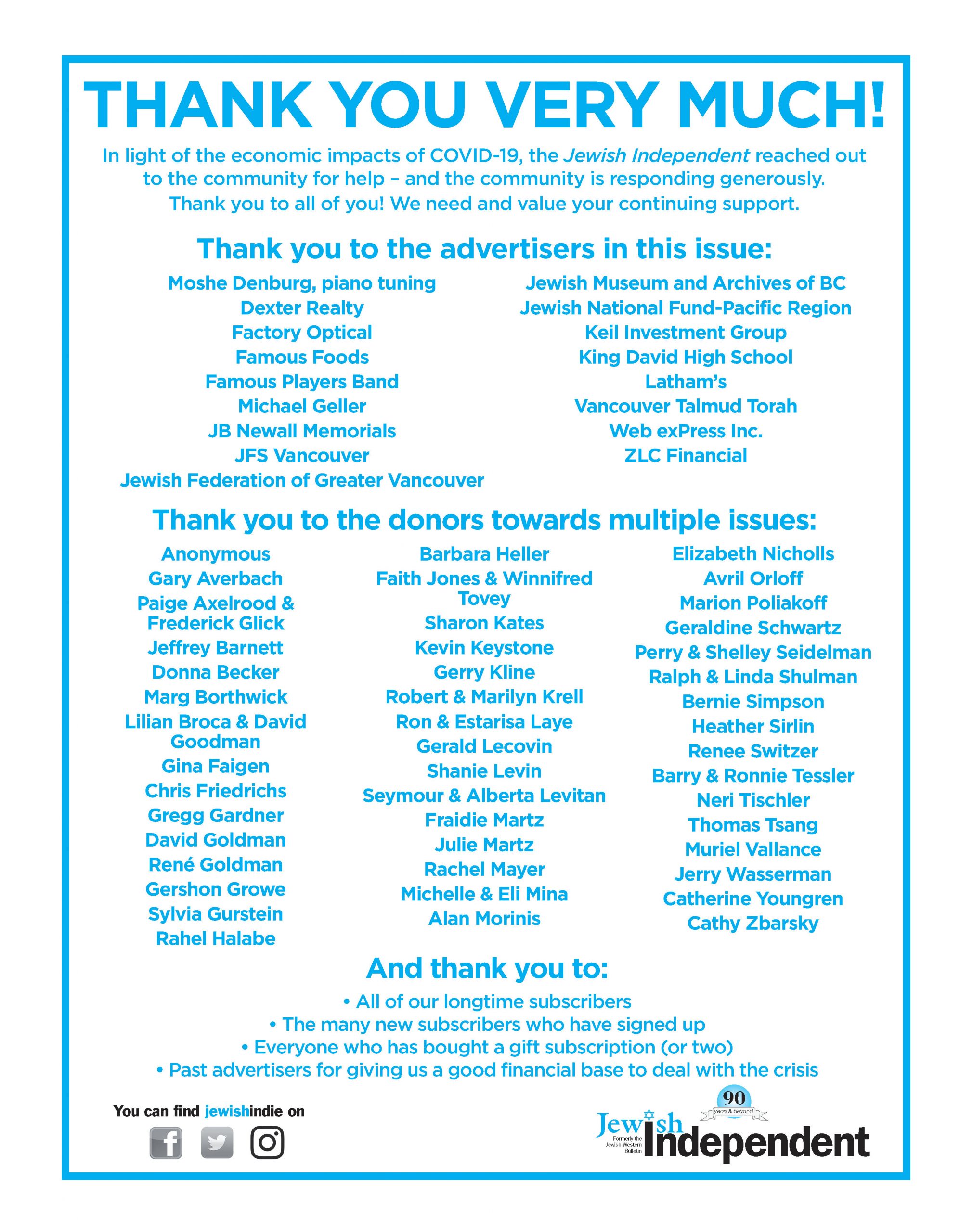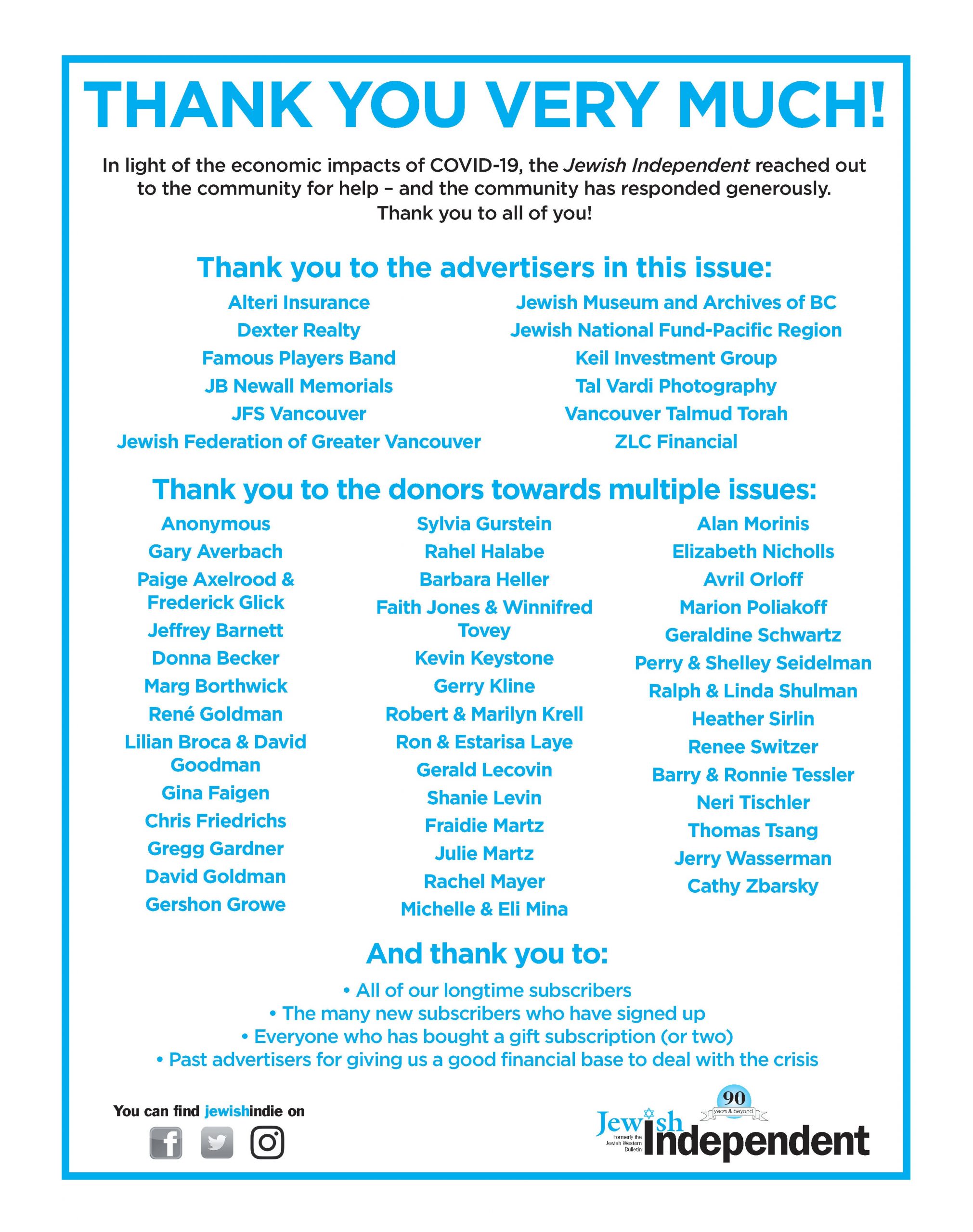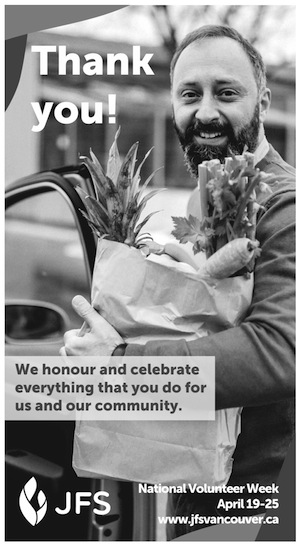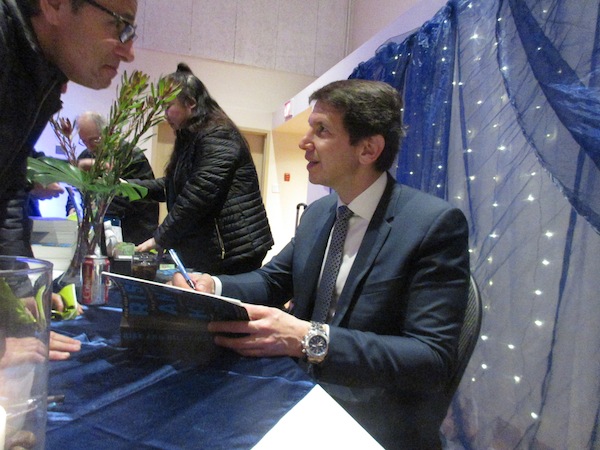Tag: journalism
Jewish media struggle, revive
Launching within hours of each other in May, the Canadian Jewish Record and TheJ.ca come at journalism from different perspectives.
Like print media as a whole, Jewish newspapers worldwide have been struggling in recent years. The coronavirus, with its economic impacts, was the last straw for Canadian Jewish News, which announced its closure in a message to readers April 13, with the words: “Everything has its season. It is time.”
From the ashes of that flagship media outlet, though, has emerged not one but two new ventures – and rumours of a possible revival of CJN itself.
Launching within hours of each other in May, the Canadian Jewish Record and TheJ.ca come at journalism from different perspectives and the people behind them think there’s room for a range of online voices, even if a national hard-copy print media option isn’t in the picture.
The Record is the brainchild of Bernie Farber, former chief executive officer of the now-defunct Canadian Jewish Congress, and Ron Csillag, a longtime reporter and editor with CJN, whose writing has appeared in the Jewish Independent. TheJ.ca, which has been in the planning stages longer, was started by Winnipeggers Marty Gold and Ron East. The editor is Dave Gordon, a Torontonian whose writing has appeared frequently in the Independent, as well as scores of other Jewish and non-Jewish publications.
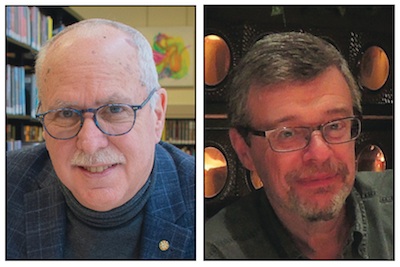
Farber and Csillag admit they don’t have a business plan beyond getting writers and editors to work for free – and they see their online venture as a stopgap that would probably cease or merge were CJN to return. The individual rumoured to be considering a rebirth of the paper opted to not comment for this story.
Farber, who was with CJC from 1984 until it was subsumed by the Centre for Israel and Jewish Affairs in 2011 and served as its head from 2006, said they launched CJR on the fly, trying to fill a need in the immediate aftermath of CJN’s demise.
“Our goal is not to become a new Canadian Jewish News,” he said. “When and if they were able to come back up … we would find some way to amalgamate. Nothing is written in stone…. We expect to continue into the fall at this point, hopefully.”
The online news and commentary site operates under the auspices of a nonprofit organization and has no money to speak of, other than enough to cover registration fees and miscellaneous costs, said Farber.
“Everybody who wrote and who is continuing to this day to write for the newspaper is doing it pro bono,” he said. “These are skilled, professional journalists who are, for the most part, people who are used to being paid for their work and have chosen to do this as a donation at this time to the community. It really is a grand mitzvah, Canadian Jewish-style, and it’s working.”
The platform got 22,000 hits in the first week, said Farber, who serves as publisher. “It’s going up from there almost exponentially.”
The model upon which their editorial approach is based is akin to CJN, he said, with a range of opinions represented.
“We’re trying to have a big tent,” he said. “We already got into some hot water because we published a piece by Dr. Mira Sucharov. She’s a wonderful writer, she’s on the edge, people don’t like what she writes, but tough shit. People are allowed to have their opinions.”
JI readers will be familiar with Sucharov’s writing. As for coverage of Israel-related topics, Farber said they will follow a similar open approach.
“It’s not that we don’t support Israel,” he said. “We’re a news source, we’re an information source. We run opinion. We’re not going to [say] you can only write good things about Israel or good things about the Jewish community. We want there to be some spark to it where people can say, no, I disagree with that. We do have an option for feedback and we do get letters to the editor. That’s the Jewish community, right? They are vibrant, they come from all over the place and we want to be able to reflect that.”
Farber and Csillag are well-known figures in the Jewish and larger Canadian scene, which is one of the reasons, they say, that the president of York University reached out to them before releasing a much-awaited report of an investigation around a violent confrontation on campus last November between pro- and anti-Israel groups. The Record got embargoed exclusive access to the report before other media. “It demonstrates how, in a short period of time, we have become a reasonable voice in the community,” Farber said.
Csillag, the editor, said they chose, at the launch on May 21, to “flood” the site with stories to keep readers engaged and coming back. Now, the aim is to post two stories a day plus any breaking news.
“People are talking about it, people are complaining about it,” he said. “I got my first bit of hate mail, which is good. That’s when you know you’re making a difference.”
Finding writers to work for free has not been a challenge. “People have been coming out of the woodwork. I never knew that pretty much everyone on the planet was a writer,” Csillag said, laughing.
Challenges they have not ironed out, they admit, include finding reliable reporters outside Ontario and a steady source of news from Israel, since they don’t have the resources to pay for a news service.
If CJN is not revived, Farber said, “I think we have to get together with serious-minded people within the community and say the CJN is gone and we are here. We don’t have a real business model to be honest. What you see is what you get…. We would have to ramp up to a real business model.”
Farber added that Canada, with the world’s fourth-largest Jewish population at 400,000, should be able to sustain at least two national Jewish media platforms.
That confidence is shared by Gordon, who equates the situation to the old joke about the Jew who, when rescued from a deserted island, was asked why he built two synagogues on the island. One, he told rescuers, was his shul; the other was the one he would never set foot in.
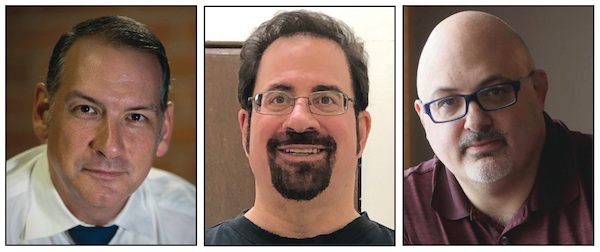
TheJ.ca has been in the planning stages for more than a year. Gordon came on a few weeks before launch. Like the Record, TheJ.ca has little overhead, since everyone associated with it works remotely. They have a few investors and some steady advertising agreements. The online nature of the platform also means no printing or distribution expenses.
Gordon touts the diversity of the large stable of writers.
“One of the things that I think is our proudest asset are individuals from the widest array possible, individuals who are liberal to conservative, Jew and Arab, religious to secular,” he said. “We have four gay columnists, we have Jews of colour who are contributing, we have coast-to-coast contributors and, in that respect, I want to say that, not only do we deliver the unexpected, but we represent the previously unrepresented.”
On Israel coverage, though, they aim to determine suitability of opinions based on the “three Ds” formulated by Natan Sharansky to determine if criticism of Israel is antisemitic: delegitimization of Israel, demonization of Israel, and subjecting Israel to double standards.
“In terms of Israel, we’re not going to make it a secret: we’re very pro-Israel, very Zionistic,” said Gordon. “It’s a good read to say that we are centre-right. We will still strive to maintain a kind of balance in terms of Israel reporting … we will tilt from time to time liberal but not left.”
Their aim is to post a batch of new content twice a week.
While Gordon is based in Toronto, TheJ.ca was born in Winnipeg. Marty Gold, a longtime broadcast journalist and publisher, and Ron East, a former pro wrestler and physical education teacher who has also been involved in publishing, are longtime friends who were critical of existing Jewish media.
East is son of the late Israeli military commander, author and counterterrorism expert Yoram Hamizrachi East. When Winnipeg saw an influx of Israeli immigrants a few years ago, the father and son launched a Hebrew-language publication to help the newcomers navigate their city. The 500 copies were routinely snapped up, he said.
The idea for the new media platform came after Gold and East felt that the established Jewish media and communal organizations in the city were not adequately confronting anti-Israel activity.
“There wasn’t really a pro-Israel, Zionistic platform out there,” said East. “We found that our local media here in Winnipeg, as well as when we started looking at Canadian Jewish News and others, were giving more and more room … and more and more credibility to what we would describe as anti-Israel, anti-Zionistic and, in some cases, pro-BDS Jewish movements. Those voices became louder and louder and the Zionistic pro-Israel voices seemed to be drowned out. We felt that it was important to provide a platform that would allow for those voices.”
While TheJ.ca is an online media platform, they are mooting a print digest that might be issued a couple of times a year. They are also working on a way to format content so that it can be easily downloaded and printed for people who prefer to hold their newspaper in their hands. Also in the hopper are plans for region-specific landing pages, so readers in Vancouver or Halifax, say, could access both items of national and international interest, as well as local news relevant to them.
The design of their site, said East, is particularly aimed at reaching younger readers. They credit Gordon’s experience in the field for bringing together a diverse group of writers from across the country.
***
The Jewish media scene has faced unprecedented challenges in recent years. The emergence of the internet more than two decades ago has undermined print media of all types, with publications for small or niche demographics experiencing particular challenges as well as advantages. The pandemic, which led to an unprecedented global economic shutdown in March, had immediate repercussions. Much of the advertising in the Independent, for example, is for upcoming community events, all of which were summarily canceled. Non-essential retailers closed, making advertising extraneous.
The Independent has continued publishing on a reduced schedule.
Winnipeg’s Jewish Post & News announced in April that it was ceasing printing, but started publishing a print edition again at the end of May.
The difficulties nearly led to the dissolution of the world’s oldest English-language Jewish newspaper, Britain’s Jewish Chronicle, which was saved by a conglomerate of philanthropists. The rival Jewish News, which had also announced its liquidation and was set to merge with the Chronicle before the surprise bailout, will, for now, continue publishing independently.
In an article recently about the state of Jewish journalism, the Times of Israel reported that New York’s Jewish Week made a dire plea for support and a leader in the American Jewish Press Association – of which the Independent is a member – acknowledged that COVID has presented a serious challenge to an already struggling sector.
The world’s third-largest Jewish community, in France, is in a different boat. In the 1980s, the French government opened radio airwaves to private groups and Jewish radio stations play a role in that country similar to the role newspapers play in most other Jewish communities.
Thank you to all who contributed to the June 26/20 issue!!!
Thank you to all who contributed to the June 12/20 issue!!!
Thank you to all who contributed to the May 29/20 issue!!!
Thank you to all who contributed to the May 15/20 issue!!!
Open letter to the community from the JI
Dear Reader,
I hope this letter finds you well, and that you are finding ways to cope with the new reality that COVID-19 has brought on all of us so suddenly. I’ll admit to moments of struggle in maintaining a positive outlook but, mostly, I am determined that, together, we will get through this crisis and return to some variation of normalcy.
For more than 20 years, I have owned and published the Jewish Independent, which started its life as the Jewish Western Bulletin in 1930. For nine decades, the paper has recorded our community’s stories, as well as news and commentary about the wider world. We have reported on the ordinary and the extraordinary, fleeting trends and paradigm shifts. We have covered happy and sad occasions, and promoted the work and activities of countless individuals and organizations. Past issues of the paper comprise a distinctive archive of our community in this place over time.
I am determined to continue this vital calling. Ensuring continuity and the thriving of Jewish life here in Canada and worldwide is no less urgent or relevant than it was in 1930. These are difficult times for many people, organizations and businesses and, among the many closures in recent days, the Canadian Jewish News ceased publication and Winnipeg’s Jewish Post & News suspended its print version indefinitely.
I firmly believe that the Jewish Independent is one of our community’s invaluable resources and that we have an important role to play during the pandemic, both in keeping the community up to date on one another’s events, initiatives and well-being, as well as offering some respite from the at-times overwhelming bad news.
For years, this publication has been a labour of love for me and a dedicated staff of a few employees and a cadre of freelance writers. As we face the coming weeks or months of increasingly dismal advertising revenues, I am making an unprecedented appeal for support from you, our readers.
I am proud to produce independent Jewish journalism that has been recognized internationally by scores of awards and accolades. I am proud that, on a very modest budget, we have managed to produce a regular publication that informs, inspires, engages, exasperates, amuses, entertains, provokes and reflects in ways that unite Jewish British Columbians across all religious, cultural, political and social divides.
You subscribe to this paper or pick it up for free at a local depot, I hope, because you see the value in this, which is why I am asking for your help through this deeply challenging time. Please consider supporting the paper through one or more of the following actions:
- Renew your subscription – or start subscribing. When you receive your annual subscription notice, please renew as quickly as you are able, as the fewer reminder notices I have to mail, the less expensive the process. If you pick up the JI at one of our many depots, please seriously think about subscribing or donating to help fund the creation, printing and distribution of the paper you now hold in your hands.
- Consider an esubscription instead of a traditional subscription. You’ll still receive the full contents of the paper, just in digital form. It saves you money and it’s more economical for us, too. (However, if you still like to hold the paper in your hands and pass it around the house, please continue to get the print edition!)
- Give a gift subscription. For generations, B.C. families have stayed connected to one another and our community through the pages of our newspaper. Keep the tradition alive with gift subscriptions to younger family members.
- Advertise with us. We know that your business or organization needs support, too. The most effective, affordable way to reach our community is through these pages, as it has been for 90 years.
- Send a greeting. You can send a message in any issue of the paper. Birthday, bar/bat mitzvah, wedding, anniversary, graduation greetings – any time is a good time to celebrate our loved ones. But now it is especially welcome. Something as affordable as a business card-size insertion is a fun way to mark a special occasion – and it sends a double message: you support thriving, independent Jewish journalism.
- Make a donation. This is the easiest and most immediate way you can help. It’s true, we’re not a charity. I can’t give you a tax receipt. But, as I’ve said, this has been a labour of love for a small group of dedicated individuals. We need you now more than ever.
You can subscribe or contribute online at jewishindependent.ca/support-the-ji via PayPal, by making an etransfer to editor@jewishindependent.ca or by calling the office at 604-689-1520.
On behalf of the staff and freelancers of the Jewish Independent, thank you to everyone who has reached out and helped the JI over the years, including recent weeks, and to all of you for taking the time to consider these words. Please stay safe and healthy.
Sincerely,
Cynthia Ramsay, Owner/Publisher
cramsay@jewishindependent.ca
PO Box 47100 RPO City Square, Vancouver, B.C. V5Z 4L6
604-689-1520 • jewishindependent.ca
Thank you to all our Israel issue advertisers!
Help save local media
(photo from arkells.com)
In what seems like a random act of kindness, the Canadian rock band the Arkells has put out an offer to their fans. Subscribe to a community newspaper and get a swag T-shirt from the band.
Musicians are facing their own challenges these days, as streaming services are upending the traditional royalty and revenue streams of their industry. But they are perhaps not yet at the level of near-desperation the print media sector has been facing in recent years. The advent of the internet and other factors (but mostly the internet) have made people expect for free things we used to access primarily through purchasing.
Oddly, perhaps, many of us are prepared to pay for multiple subscription services for media – Spotify for music, Netflix, Crave, Disney and an ever-growing number of video services – but most people still react to paywalls on print media by finding a free (to them) alternative. As a result, print outlets from the New York Times and the Globe and Mail to, well, the Jewish Independent have struggled to find alternative sources of revenue and the means to compensate for the reality that readers are demanding (and getting) for free what they once paid for.
In keeping with the issue-driven approach to songwriting for which the Hamilton-based band is known, it was a pleasant and heartfelt message that the Arkells – whose lead singer, Max Kerman, is a member of the Jewish community – put out to their fans.
“If you’re an engaged member of your community, you’re probably thankful for the people who report the news. And even if you’re not, you’re probably still reassured to know that someone is keeping tabs,” they write.
“Good reporting not only keeps us in the loop, but also makes sure our big wigs are held accountable – to ensure there is no sneaky biz.
“Somewhere along the way, we took this for granted. We forgot that we have to pay for this vital service, and that reporting the news isn’t free. In our own city, we’ve seen our local newspaper continue to shrink, and we worry about its future and the future of other local newspapers.”
The band invites their fans to join them in investing in “the things that truly matter.”
“Let’s start,” they write, “by supporting your local paper or a daily publication you really admire. It’s been years in the making. No more running from that paywall.”
They are asking listeners to take out a year-long paid subscription to a print or online media platform (or gift one to a friend) and to let them – the Arkells – know. Then the specially designed band T-shirt will be on its way to you.
Obviously, a gesture like this is not going to save the industry. But it is sweet nonetheless, especially to see someone without a vested interest making this case. Then again, maybe their point is that every citizen does have a vested interest in the success, or at least survival, of local media.
For the Jewish community in British Columbia … that’s us! For 90 years now, the Independent and our previous incarnation the Jewish Western Bulletin have been printing the first draft of our community’s history. At the risk of sounding self-aggrandizing, there are times when we write stories as much for posterity as for this week’s readers. We know that the archives of this paper is often the first destination for people researching aspects of our community’s history. We believe that, decades hence, researchers will see in a visit to Vancouver by a renowned researcher or an act of tikkun olam or a project by local high school students as the germ of a movement, or a way-station in the progress of an idea, that is significant in its own right but also speaks to a larger trend in our community or society. Or maybe someone will just enjoy the read. In other words, we view our work as immediate and, ideally, enduring in some manner even we cannot foresee.
While in many cities across North America, the local paper is operated by the Jewish federation, here it has been run for well more than a half-century now by independent business operators taking a not insignificant risk for the community’s benefit. Operating a Jewish newspaper was never going to be the route to riches. The remarkably small number of people who have led this endeavour over the past nine decades knew this at the outset. But the challenges of the 21st century are particularly acute.
We thank you for your support and humbly ask you to recommit to our shared enterprise in this, our 90th, year. Perhaps a gift subscription to family or friends – especially younger generations, whose engagement is critical not only for the future of our newspaper but for our community. Or simply a gift to help sustain the paper, which would mean a great deal to the small team that puts this package together each week and, we believe, to the strength and future viability of our community. Plus, you could get a cool shirt for you, your kids or grandkids if you let the Arkells know about it!
Sharing legends of Mossad
Ronen Bergman signs a copy of his book Rise and Kill First: The Secret History of Israel’s Targeted Assassinations for an attendee of his talk at Congregation Beth Tikvah Feb. 2. (photo by Pat Johnson)
Ronen Bergman, perhaps the leading historian on Israeli intelligence, spoke in Richmond recently, engaging a packed sanctuary at Congregation Beth Tikvah Feb. 2 with stories that make Ocean’s Eleven pale in comparison.
Bergman, a staff writer at The New York Times Magazine and senior political and military analyst for the Israeli daily Yedioth Ahronoth, shared the history of the Mossad as told in his bestselling book Rise and Kill First: The Secret History of Israel’s Targeted Assassinations. One had an extremely timely conclusion.
Imad Mughniyeh was the military commander of Hezbollah, who Bergman called “the most wanted and most capable and most diabolical terrorist who ever walked the face of the earth.” Mughniyeh is believed responsible for the 1983 bombing of the U.S. embassy in Beirut and truck bombings in the same city, which killed hundreds of U.S. and French military personnel, and also was involved in the 1992 bombing of the Israeli embassy in Buenos Aires and the 1994 bombing of the AMIA Jewish community centre there, as well as countless other atrocities worldwide.
“He was wanted by 41 different countries and the only thing they had from him is a vague photograph from 1983,” said Bergman. Finally, the Mossad located Mughniyeh in a safe house in Damascus, but, since Israel does not have diplomatic relations with Syria and, therefore, does not have an embassy there, they were at a disadvantage. Embassies are a great boon to spies, he said.
“You can have diplomatic immunity, you have cars, you have diplomatic mail, you can smuggle, it’s wonderful,” he said. “But they couldn’t get to him, they couldn’t kill him in Damascus, because it was so hard to operate, so Mossad turned to the only organization that could: the CIA. Because the CIA had something that Mossad will never have in Damascus: an embassy.”
The CIA required permission from then-U.S. President George W. Bush, so Ehud Olmert, who was then Israel’s prime minister, flew to Washington for a secret meeting with Bush and urged the president to help Mossad take out the terrorist, noting the number of Americans Mughniyeh had killed.
“George Bush was convinced, but he said on one condition – no collateral damage,” Bergman said. No bystanders or associates were to be harmed.
Working with the CIA, the Mossad set up the scenario and then aborted the operation 53 times because the target was not within the defined kill zone or because he was not alone or because, on one occasion, his identity could not be 100% verified because he was wearing a scarf due to inclement weather.
On Feb. 12, 2008, Mughniyeh left the safe house and the Mossad was about to push the button when they realized he was not alone.
“He’s walking with a man,” Bergman recounted. “Someone looks at the monitor and says, oh that’s not just a man, that’s Good Dog. Good Dog was the codename for Qasem Soleimani,” the top Iranian general and commander of the Quds Force, responsible for clandestine operations and global terror.
“So, someone said, how wonderful, let’s take them both,” said Bergman. “They called Meir Dagan [director of Mossad], who was sitting shivah for his mother. He calls Olmert and Olmert says no, abort, I promised President Bush that only Mughniyeh is killed.”
Later that same day, Mughniyeh was found alone outside the safe house and killed by an exploding car as he passed on foot. But Soleimani would live another dozen years – until he was killed Jan. 3 of this year, on orders of U.S. President Donald Trump, sparking a conflict that nearly led to all-out war between the United States and Iran.
Bergman, a lawyer and author of six bestselling books, recently received the Sokolov Prize, Israel’s equivalent of the Pulitzer. In undertaking Rise and Kill First, Bergman discarded all previous work on the subject and interviewed 1,000 intelligence officials and others with inside information on the Mossad and its operations. The book is now being turned into an HBO series.
Bergman recounted how, in 2018, Israel stunned the world when Prime Minister Binyamin Netanyahu invited the media to view a massive cache of documents and other materials related to the Iranian nuclear project. The moment was the culmination of two years of planning, involving 500 operatives, including 18 who located and infiltrated a secret archive outside Tehran, then swooped in, with a five-and-a-half-hour window in the middle of the night, to execute the deed and escape, relocating the ayatollah’s nuclear secrets to Israel.
Even with the Mossad’s expertise at safe-cracking, the team knew that they would not have time, once inside the archive, to fiddle with locks.
“So, Mossad establishes a front company in Europe who orders two empty safes from the same Iranian manufacturer. They ship the safes to Paris, then ship them to the Mossad lab in Tel Aviv, where they start drilling into them, trying to find what’s the fastest way to open them.”
They determined that it would require at least 3,600 degrees Fahrenheit to break into the archives’ security.
“Now imagine what sort of energy you need to shlep with you to Tehran in order to create such energy and do that in four different places because you need to open all the vaults,” said Bergman. They also had to bypass other security systems and interfere with video surveillance to make the cameras continue broadcasting as if nothing untoward was happening.
In the morning, when the heist was discovered by archives security officials, Bergman said, “no less than 12,000 troops, Revolutionary Guards, policeman, army” and others descended on the place, but could not discern how anyone could get in, grab all the contents and get out undetected. It would be two months until Netanyahu went public and the Iranians could finally confirm that the perpetrators were Mossad.
“Someone could ask, why should we write a book about the history of the Mossad? This is secret, right?” Bergman said. He acknowledges he left out a great number of secrets, some of which he will take to the grave, but added that it is impossible to tell the story of Israel without telling the story of the Mossad because any major decisions, any turning points in the dramatic story of the country, have the imprint of the intelligence services on it.
He warned, though, that this is not all derring-do and triumph. “If you want to read a book just glorifying Israeli intelligence, I suggest you don’t read Rise and Kill First,” he said. “Sometimes, the Jewish James Bond looks more like Inspector Clouseau.”
Many people ask Bergman how he got the top intelligence officials in the country – former heads of agency, high-level operatives, spies and agents – to talk, usually quite freely and almost always on the record.
“It was easy,” he said. “I smiled. When you smile to people, they feel comfortable to talk. But that’s not the whole answer. These people wanted to talk because they wanted people to know … what they have done in order to keep Israel safe.”
Some interviewees said they told Bergman things they had never told their spouses. But, when subjects were not forthcoming, he had a trick.
“If someone was not that enthusiastic to speak, I did to him or her the one thing that makes Israelis more ballistic and furious than anything else,” Bergman said. “I told him someone else took credit for his operations.”
He mooted a typical response: “What? He said that he was behind enemy lines, that he planned the operation, that he risked his life? Now I’m going to tell you the truth,” Bergman deadpanned. “Always works.”
In a remarkable number of the interviews, a single phrase frequently stood out: a quote from the Babylonian Talmud: “Whoever comes to kill you, rise up and kill him first.”
“Because the way they saw it, they had no other choice,” said Bergman, noting that outsiders cannot understand the DNA, the genome, the motives of Israelis, without understanding the imprint of the Holocaust and the determination to never be powerless again.
Hamas has bragged that they have more volunteers for suicide bombings than they have suicide belts.
“It turns out the only thing that stops these people from coming is the most extensive campaign of targeted killing ever launched in history – and not against the suicide bombers,” said Bergman. “When the Shin Bet [Israel’s internal security service] and Israeli Air Force started to target the layer above them – the bomb-makers, the indoctrinators, the recruiters, the regional commanders – then it turns out that these people who have no problem with sending everybody to their death, once the price tag is attached to themselves and their families, they say, well, we’ll die, but maybe not today.”
The targeting approach, said Bergman, was adopted by the United States, whose military leaders came to realize that taking out the top leadership of the enemy was ultimately less lethal and costly than the alternatives.
“And so, the CIA started following the successful Israeli experience, started to perform targeted killings,” said Bergman. “Do you know the president who organized the largest number of targeted killings in history? Barack Obama, because he realized that this is the weapon that, at the end of the day, takes less human lives than going into an all-out war. And it’s effective.”
Leanne Hazon, Beth Tikvah’s vice-president of programming, welcomed the audience and noted the size of the crowd despite it being Super Bowl Sunday. Rabbi Adam Rubin introduced Bergman. The author signed copies of his book after his talk.



